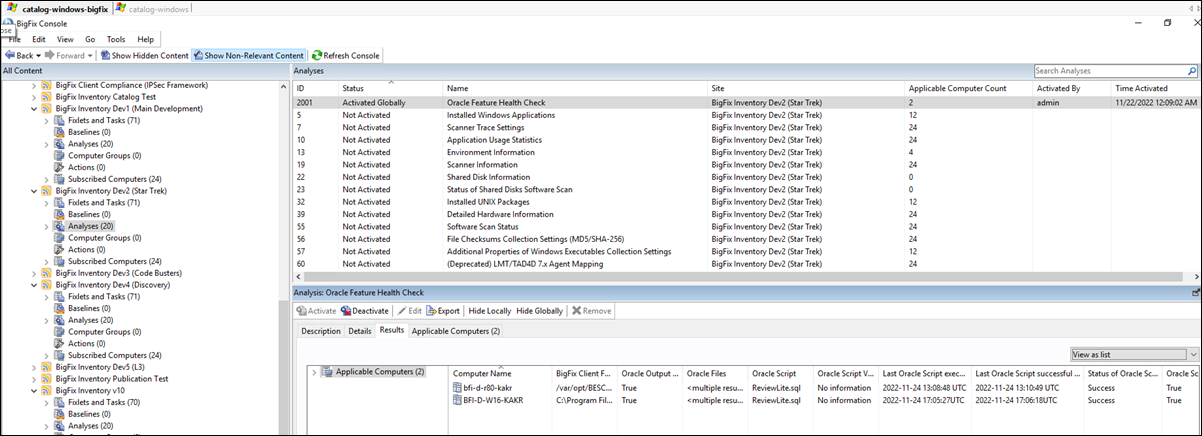 Handling common
situations with extended oracle discovery
Handling common
situations with extended oracle discovery
BigFix Inventory version 10.0.11 offers improvements related to serviceability.
Fixlet execution ends up with an exit code in the 'Computers' tab for each endpoint on which it was executed. Each exit code represents a common probable situation.
- check the exit code
- check analysis results
- check logs on a machine or get them from Computer Support Data
- contact support (HCL or Oracle as per the need)
Get Oracle Feature Fixlet results
When you activate the Get Oracle Feature fixlet, two types of results are received; Failed or Completed. The below image shows both the scenarios where some of the scan is complete and some have failed. The details, such as Exit code, computer name that were scanned, the operating systems, the CPU, last report time, etc, are also displayed.

Exit codes
The Extended Oracle Discovery feature in BigFix Inventory exit codes which provide feedback about issues occurred when you run the scan for databases.
| Exit code | Description |
|---|---|
| 0 - Everything went fine | Configuration Management Pack |
| 1 - Generic error | This is a generic error, which means there was some issue/problem which caused the program to exit. |
| 2 - Misuse of Shell Built-in command | Could be caused by incompatibility with older systems.
Command options differ between operating systems. This error could be shown especially on older systems attempting to use the command option, which simply does not exist, but on a newer system. |
| 10 - Database querying problem | Oracle Database error codes start with ORA- prefix, this code
shows what happened. Refer to the Oracle website to view the
list of error codes. The error could be thrown when the syntax of SQL queries changes, and the query could be incompatible with a newer database engine. Additionally, Oracle Database views change from release to release. Oracle databases could be in 4 states: started, mounted, open, and restricted. Only in an open state, all database views are available to query. When the auditing script tries to read these views, but the database is not open output files will have many errors: ORA-01219: database not open: queries allowed on fixed tables/views only Because of the inability to interpret data properly in that situation, the fixlet will exit with an error. |
| 11 - Cannot find output from database listing query | This could be shown on the windows operating system due to file permissions, fixlet is not able to save output files properly. |
| 20 - SQL Plus failed at connecting to the database | There might be a problem with the authorization or a direct
problem with sqlplus command
execution.Handling on the usage of
Database admin, for example, can forbid access for the service user which we are trying to use, this will appear as an authorization problem. |
| 30 - Cannot map a user to a system username | On UNIX operating systems during the database recognition
step, fixlet tries to use the security privileges user which
started the database. This user is the service user used to
access the Oracle database. For example, when the database
process is executed in a container. On Solaris with Zones probably scan is executed in Global Zone, which will not be able to proceed when Oracle Database will be executed in Local Zones. BigFix Agent should be installed in the same Zone in which the Oracle Database process is executed. |
| 127 - A command couldn’t be found | On some command execution, the operating
system checks PATH to find the binary, but it fails. For example, when a user has changed the PATH environment variable, there is nothing to point to. |
Oracle Features Health Check fixlet results
To check whether the task completed successfully or to troubleshoot a problem, go to Analyses, right-click Oracle Features Health Check, and then click Activate. The analysis provides information about the type and version of Oracle script that was initiated though the Get Oracle Features fixlet. It also provides information about the time of last execution of the fixlet, and its status: Success, Failure or Partial Success. If the status is Partial Success, the script was run successfully only on some Oracle instances on a given computer.

Obtain Get Oracle Feature Fixlet logs
You can obtain the fixlet logs in the below location:
 /var/opt/BESClient/LMT/ORACLE
/var/opt/BESClient/LMT/ORACLEThe fixlets logs are available in the oracle.log file. When debug mode is enabled more detailed information is saved in same file.
 C:\Program Files (x86)\BigFix Enterprise\BES
Client\LMT\ORACLE
C:\Program Files (x86)\BigFix Enterprise\BES
Client\LMT\ORACLEThe fixlets logs are available in the oracle.log file. When debug mode is enabled, the debug pieces of information are saved in script_trace.txt.
For more information on obtaining logs, refer to Collecting logs for troubleshooting purposes.